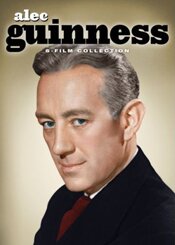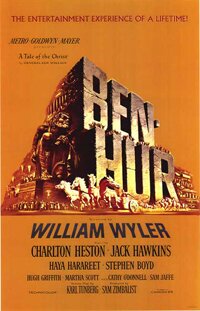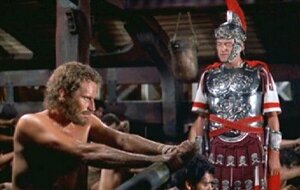It’s Day 2 of For the Love of Film (Noir) — don’t forget to (or use the button on the right). Today I have a quickly scribbled, un-proofed, un-thought through look at the movie I watched last night. The studio considered calling it Hot Spot but, according to the DVD I have, the actors insisted on them using the original name, which is …
I Wake Up Screaming (1941)
Directed by H. Bruce Humberstone
As I watched I Wake Up Screaming last night I had two thoughts running concurrently. First, this should not be a good movie. Second, somehow it manages to be a good movie. How does that happen?
I’m not sure. I think it lies partly in Betty Grable, whose performance is a level above the other main actors in the movie.
It’s also in the characterization of Ed Cornell, played by Laird Cregar, who seems a cross between Vincent Price (in the slightly effeminate voice and its cadence) and possibly a low rent version of George Sand. (I mean vocally, nothing else, and not much there either. But there seems to be something vaguely Sand-ish in the voice.)
Cregar’s Cornell is creepy, to say the least, and that makes the movie compelling. Though the film’s mystery may be obvious, it doesn’t matter. The creepiness keeps us fascinated in a “slowing down to view the accident” kind of way. Cregar’s character isn’t the only one that gives us the willies.
Elisha Cook Jr.’s Harry is equally troubling. Soft-spoken and gentle, his focus and attentiveness to Grable’s Jill Lynn leaves us feeling something isn’t right about him. He’s stalker material.
Much of what makes the movie watchable is in the script. The bad guys in this movie – and there are a lot of them – are not villains so much in the commitment of crimes regard, as in their psychology. In fact, most of them have stalker-like personalities or variants of it.
They are all focused in some way on Vicky Lynn, played by Carole Landis. They want to either possess her, use her, or both. And she, being ambitious, is happy to permit it as she uses them. Thus, in a sense, she invites what follows from it.
Into this morass of twisted personalities come Victor Mature as Frankie, a kind of nice if goofy sports promoter (who find himself accused of murder) and Vicky’s sister, Grable’s Jill Lynn.
Frankie and Jill are the normal ones (for lack of a better word) and also the ones who suffer the consequences of a world populated by twisted personalities.
Visually, the movie delivers the noir goods but that may be less an aesthetic decision as a kneejerk response to making a crime movie in the forties. Crime equals scenes of darkness and shadow, ergo scenes of darkness and shadow. I get the sense director H. Bruce Humberstone was a paint-by-numbers kind of director, though that may be unfair to him. But that is how it strikes me.
Still, by accident or design, the movie looks good as a noir. It has a low budget feel and some very nice shots, especially near the end where we see Mature looking down at Harry snoozing at the front desk.
Overall, then, I Wake Up Screaming strikes me as an accidental noir. It discovers a noir world in the script it brings to the screen and in the kind of kneejerk response of how it visually portrays that script.
Much of what happens on screen is highly melodramatic and it would be too much were it not for the material driving it, Laird’s unsettling Cornell, and Grable’s much better anchored performance as Jill. Victor Mature looks great as a noir character, especially in the interrogation scenes, but he is often well over-the-top. Also, for about two thirds of the movie, once outside the interrogation room (and often within it) he plays a goofy kind of guy without a care in the world. It’s deliberate, in part, as it’s an aspect of the character. But it just seems too much.
And having gone on with all these negative comments about the movie, I still have to say I liked it quite a bit. However, it feels to me it’s a good movie through dumb luck; a film noir by accident.

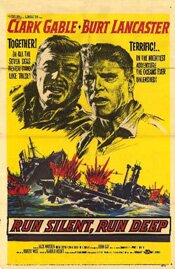 Run Silent, Run Deep (1958)
Run Silent, Run Deep (1958)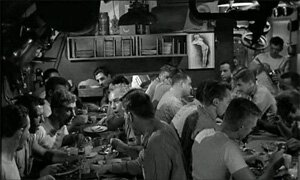 Run Silent, Run Deep is a guy movie. There are really only two female roles in the movie: a very small part as Gable’s wife (Mary LaRoche) and a pin-up poster. It’s all guys and for the most part they are confined in a submarine. Despite that, it’s a good movie. Actually, it is because of that it is a good movie. It knows what it is about and its focus doesn’t waver.
Run Silent, Run Deep is a guy movie. There are really only two female roles in the movie: a very small part as Gable’s wife (Mary LaRoche) and a pin-up poster. It’s all guys and for the most part they are confined in a submarine. Despite that, it’s a good movie. Actually, it is because of that it is a good movie. It knows what it is about and its focus doesn’t waver.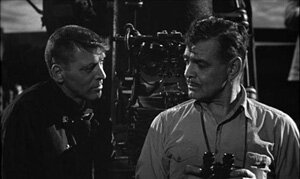 Gravitas, like the word gravity, comes from the Latin word “gravis” which means seriousness or weightiness. Gable communicates it wonderfully. Lancaster does to a degree too, though in a different way. Between the two actors, you get a nicely dramatic contrast.
Gravitas, like the word gravity, comes from the Latin word “gravis” which means seriousness or weightiness. Gable communicates it wonderfully. Lancaster does to a degree too, though in a different way. Between the two actors, you get a nicely dramatic contrast.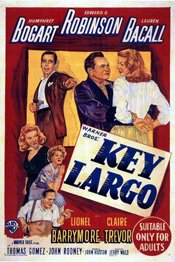 Key Largo (1948)
Key Largo (1948)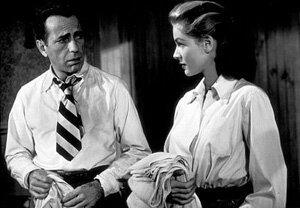 Having left the Army, ex-Major Frank McCloud goes to Key Largo to pay respects to the family of one of the soldiers under his command who was killed in action. McCloud seems a bit aimless having left the army; this obligation he feels to visit the family is about the only purpose he has at this stage in his life.
Having left the Army, ex-Major Frank McCloud goes to Key Largo to pay respects to the family of one of the soldiers under his command who was killed in action. McCloud seems a bit aimless having left the army; this obligation he feels to visit the family is about the only purpose he has at this stage in his life.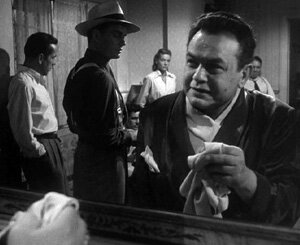 What the movie does is to bring all these characters together in one place and confine them in close quarters. You feel the walls closing in, so to speak, as the winds get stronger and shutters are closed. They are all closed in; sunlight vanishes.
What the movie does is to bring all these characters together in one place and confine them in close quarters. You feel the walls closing in, so to speak, as the winds get stronger and shutters are closed. They are all closed in; sunlight vanishes.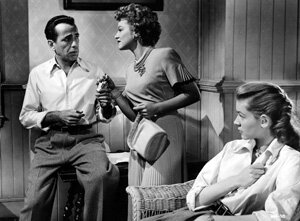 Tension builds in the movie partly because of the storm, partly because Johnny Rocco gets increasingly anxious about completing his deal, but also because of the forward and backward pull between the characters: Johnny’s will to go back to the past; McCloud and the others’ desire to break free and go forward into the future.
Tension builds in the movie partly because of the storm, partly because Johnny Rocco gets increasingly anxious about completing his deal, but also because of the forward and backward pull between the characters: Johnny’s will to go back to the past; McCloud and the others’ desire to break free and go forward into the future.

